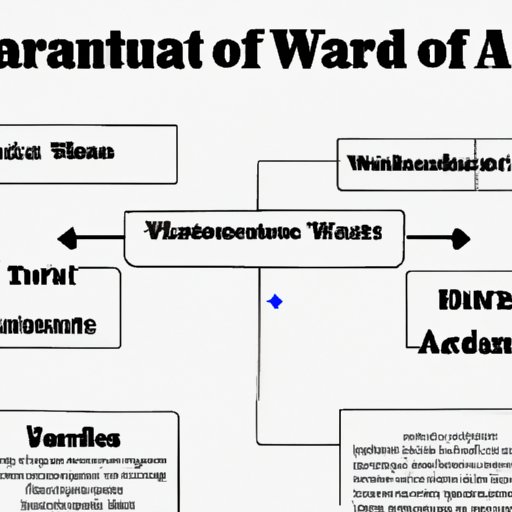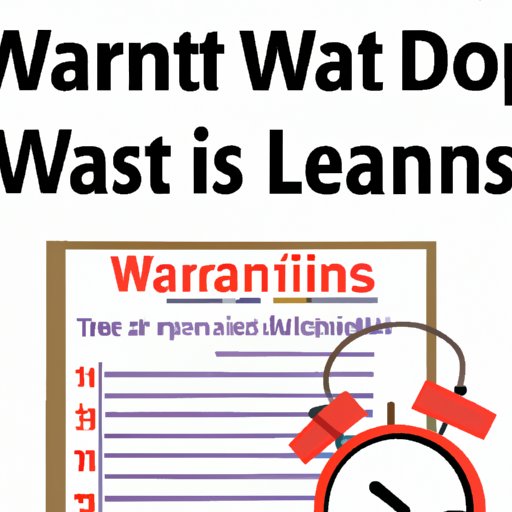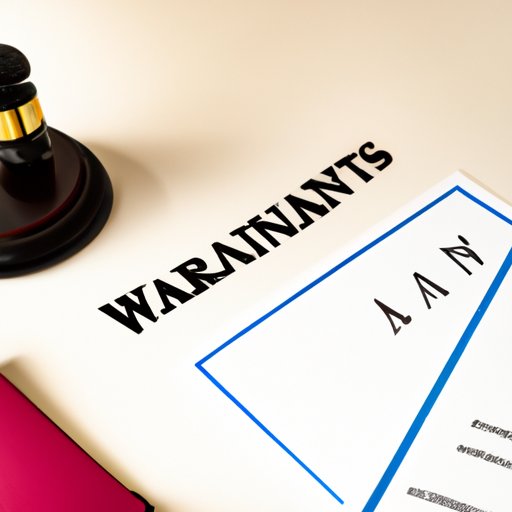Introduction
A warrant is a legal document issued by a court or other judicial authority, which empowers law enforcement to detain an individual or search a specific location. Warrants are issued when there is probable cause to believe that a person has committed a crime or when there is reasonable suspicion that an individual is engaging in criminal activity. So, how long does it take for warrants to be issued? The answer depends on a variety of factors, such as the nature of the crime, the availability of evidence, and the jurisdiction involved.
Examining Factors That Impact How Long it Takes for a Warrant to Be Issued
The time frame for a warrant to be issued can vary greatly depending on the situation. Several factors can influence the amount of time it takes for a warrant to be issued, including:
Nature of the Crime
The type of crime being investigated can have a significant impact on the amount of time it takes for a warrant to be issued. For example, violent crimes typically require more extensive investigation than non-violent crimes and may take longer for a warrant to be issued. In addition, cases involving more serious charges tend to take longer to investigate, as law enforcement must gather more evidence and build stronger cases before a warrant is issued.
Availability of Evidence
The amount of evidence available to support the request for a warrant can also impact the length of time it takes for a warrant to be issued. If there is a substantial amount of evidence to support the issuance of a warrant, then it may take less time for the warrant to be issued. On the other hand, if there is not enough evidence or the evidence is weak, then it may take longer for the warrant to be issued.
Jurisdiction
The jurisdiction in which the crime occurred can have an effect on the amount of time it takes for a warrant to be issued. In some jurisdictions, the process of obtaining a warrant may be faster than in other jurisdictions due to local laws and regulations. Additionally, if the crime involves multiple jurisdictions, then the process of obtaining a warrant can be more complicated and may take longer.

A Guide to Understanding the Process of Obtaining a Warrant
In order to understand how long it takes for a warrant to be issued, it is important to understand the process of obtaining a warrant. Generally, the process involves four steps: filing a complaint, review by a magistrate or judge, signing of the warrant, and execution of the warrant. Here is an overview of each step in the process:
Filing a Complaint
The first step in the process of obtaining a warrant is filing a complaint with the appropriate law enforcement agency. The complaint should include detailed information about the alleged crime, such as the date, time, and location of the incident, as well as any other relevant details. Once the complaint is filed, the law enforcement agency will begin investigating the incident and gathering evidence.
Review by Magistrate or Judge
Once the law enforcement agency has gathered sufficient evidence, they will present their findings to a magistrate or judge. The magistrate or judge will review the evidence presented and determine whether there is probable cause to issue a warrant. If the magistrate or judge determines that there is sufficient evidence to issue a warrant, then they will sign the warrant.
Signing of Warrant
Once the warrant is signed, the law enforcement agency can execute the warrant. Depending on the jurisdiction, the warrant may be served immediately or within a certain time frame.

Exploring the Legalities Surrounding Warrants and the Time Frames Involved
When exploring the legalities surrounding warrants and the associated time frames, there are several key points to consider. First, it is important to understand the statutes of limitations, which are the legal deadlines for filing a lawsuit or criminal charge. These statutes of limitations vary from state to state and can impact the amount of time it takes for a warrant to be issued.
It is also important to understand the different types of warrants and the associated time frames. Search warrants typically take longer to obtain than arrest warrants, as the former requires more extensive investigation and evidence gathering. Bench warrants, which are issued when a defendant fails to appear in court, can be issued quickly but may take longer to serve.
Finally, it is important to understand that there are exceptions to the time frames associated with obtaining a warrant. For example, in some cases, a warrant may be issued without prior notice if there is a risk of harm to the public or if the suspect is likely to flee the jurisdiction.

What You Need to Know About Warrants and the Length of Time it Takes for Them to Be Issued
When it comes to understanding the length of time it takes for a warrant to be issued, there are several common misconceptions. For example, many people assume that warrants are issued immediately after a crime is reported, but this is not always the case. As mentioned above, the amount of time it takes for a warrant to be issued can vary greatly depending on the circumstances.
It is also important to be aware of potential delays in the warrant process. Delays can occur due to a variety of factors, such as an incomplete investigation or a backlog of cases. Additionally, if a warrant is issued in another jurisdiction, then it may take longer for the warrant to be served.
Finally, there are several tips for speeding up the warrant process. For instance, it is important to provide as much detailed information as possible when filing a complaint, as this can help expedite the investigation. Additionally, if you are aware of any evidence that could support the issuance of a warrant, then it is important to make this known to the law enforcement agency.
A Comprehensive Look at the Different Stages of the Warrant Process and the Associated Timelines
To get a comprehensive understanding of the warrant process and the associated timelines, it is helpful to examine the different stages of the process. Here is an overview of the different stages and the typical time frames associated with each:
Pre-Warrant Investigation
The pre-warrant investigation is the first stage of the process and typically involves gathering evidence, interviewing witnesses, and conducting searches. This stage typically takes anywhere from a few days to several weeks, depending on the complexity of the case.
Search Warrants
Search warrants are typically issued after the pre-warrant investigation is complete and the law enforcement agency has gathered enough evidence to support the request for a warrant. This stage of the process typically takes anywhere from a few hours to a few days.
Arrest Warrants
Arrest warrants are typically issued after a search warrant has been executed and the law enforcement agency has gathered enough evidence to support the arrest of a suspect. This stage of the process typically takes anywhere from a few hours to a few days.
Bench Warrants
Bench warrants are typically issued when a defendant fails to appear in court. This stage of the process typically takes anywhere from a few hours to a few days.
Conclusion
Overall, the amount of time it takes for a warrant to be issued can vary greatly depending on the circumstances. The nature of the crime, the availability of evidence, and the jurisdiction all play a role in determining how long it takes for a warrant to be issued. Additionally, it is important to understand the different stages of the warrant process and the associated time frames. By understanding the process and the factors that influence the length of time it takes for a warrant to be issued, you can better prepare yourself for what to expect.
(Note: Is this article not meeting your expectations? Do you have knowledge or insights to share? Unlock new opportunities and expand your reach by joining our authors team. Click Registration to join us and share your expertise with our readers.)
